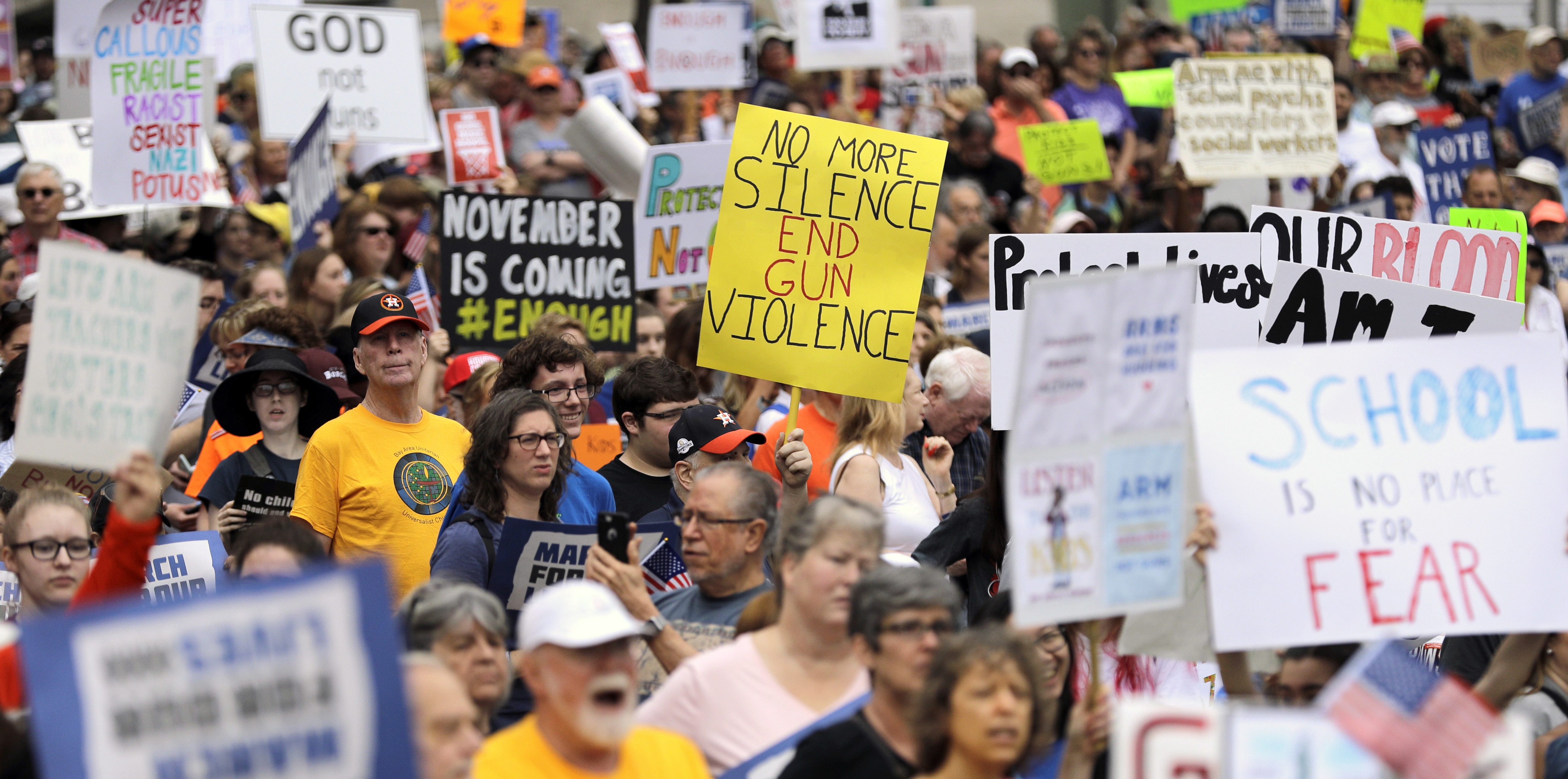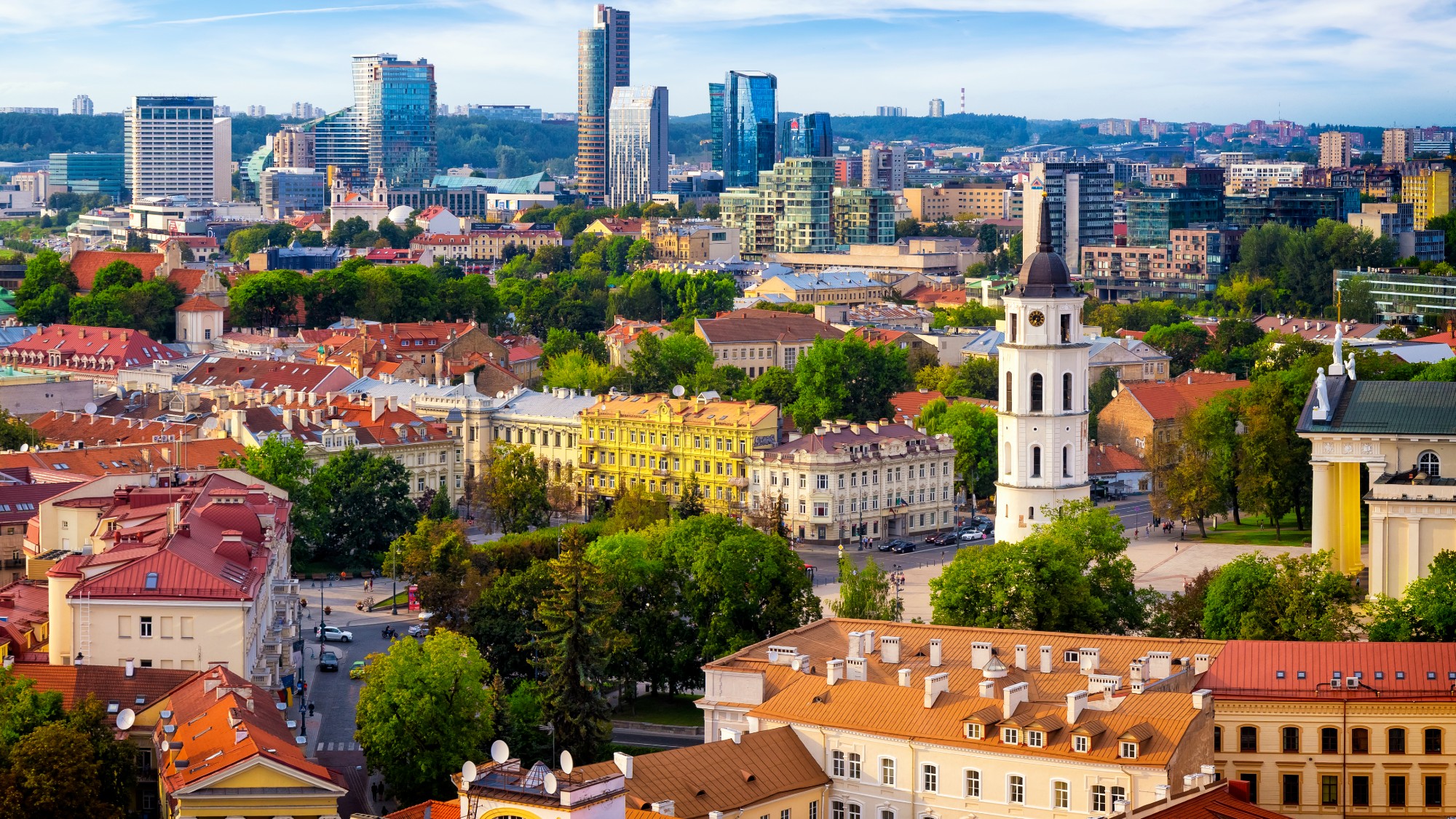Has gun reform reached a tipping point?
Believers in gun control are starting to feel as intensely as gun rights supporters. Here's why that's a big deal.


For about two decades now, pretty much everyone has accepted that on a national level, any kind of change in gun laws is impossible. Why is that? "The power of the National Rifle Association" is a common answer, but dig one layer deeper and what you'll hear is that the NRA's power comes from gun owners themselves, and how they're fundamentally different from your average voter who would rather see more restrictions on guns.
Let's imagine them as two next-door neighbors, Mitch and Alice, who are represented by all the same officeholders. Mitch owns a few guns and is a member of the NRA. He cares deeply about his Second Amendment rights — so deeply, in fact, that he won't consider voting for any politician who doesn't pledge to uphold them. The NRA helpfully offers him a regular stream of emails, texts, and written material telling him which politicians are on the right side. When they send out an alert asking him to contact his member of Congress or the state legislature about some pending gun issue, he does it. Meet him in a coffee shop or in his office, and Mitch is ready to talk guns, with well-honed arguments he's learned from listening to pro-gun media figures and talking to other gun owners.
Alice, on the other hand, thinks it's terrible that there's so much gun violence in America. But she doesn't do anything in particular about it. She's not big on signing petitions or pestering lawmakers. She has a lot of issues she cares about, and guns isn't always at the top of the list. She'd rather have representatives who reflect her views on guns, but if a candidate who's right on the other things she cares about is also pro-gun, she might vote for them anyway.
The Week
Escape your echo chamber. Get the facts behind the news, plus analysis from multiple perspectives.

Sign up for The Week's Free Newsletters
From our morning news briefing to a weekly Good News Newsletter, get the best of The Week delivered directly to your inbox.
From our morning news briefing to a weekly Good News Newsletter, get the best of The Week delivered directly to your inbox.
Because of this difference, politicians are afraid of Mitch, but they're not afraid of Alice. That's the story we've been told for 20 years, and in general terms if not always the specifics, it's true.
But maybe not anymore.
It's safe to say that the forces favoring gun reform are more organized and motivated now than they've been at least since the early 1990s when the Brady law and an assault weapons ban were passed, and maybe ever. We've certainly never seen mass protests on the scale of the ones last weekend, where a couple million people (though we don't have a precise number) demonstrated in hundreds of cities and towns across the country demanding new restrictions on guns.
And critically, Democratic politicians are getting less and less afraid of the NRA, which makes them willing and even eager to campaign on the gun issue. For instance, here's an ad from a Democratic congressional candidate in Florida, in which she tells how her father was killed by a criminal with a gun and promises to pursue gun control measures if she's elected. A Democratic House candidate in Illinois says the Parkland students "basically made it possible for someone like me to say I'll be honest and open with my positions and can still fend [opposition from the NRA] off."
A free daily email with the biggest news stories of the day – and the best features from TheWeek.com
When politicians start to talk differently, it has an agenda-setting effect, feeding media coverage and signaling to Democratic voters that this should be one of the core issues they consider in evaluating candidates. Which then leads more candidates to talk about it, and the cycle feeds itself.
Polls are showing support for new gun restrictions at their highest level in decades; two-thirds of Americans now say we should tighten our gun laws. But will it stick? Will the people who are now protesting and donating and retweeting become something like the single-issue voters the NRA tries to create?
One of the NRA's great achievements in recent years has been convincing many gun owners that owning guns is an absolutely central part of their identity. It's not a thing you own or a thing you do, it's who you are. Just as a Christian probably wouldn't vote for someone who said "I agree with you on most things, I just disagree with you on whether Christians should be rounded up and put into internment camps," you should never even consider someone who would support gun control, and any politician who favors even the most modest gun restrictions has shown themselves to be your enemy.
Because they were so successful in making that link between guns and identity, and so good at activating their members to make lots of noise, they managed to make support for unfettered gun rights a central part of what it means to be a Republican in today's America, almost on par with belief in low taxes and restrictions on abortion rights. Yet that too shows signs of strain. Florida governor Rick Scott, heretofore a stalwart ally of the NRA, signed a bill with some modest gun restrictions that the NRA opposed, including raising the age to buy a rifle in the state from 18 to 21. Other Republicans are tentatively announcing their support for expanded background checks or, in a few cases, even a ban on purchases of military-style rifles.
We don't yet know how many Democratic voters will come to see support for gun restrictions as central to their own identity and the identity of the places they want to live. But one of the key things to watch out for is how the 2018 election gets interpreted. Let's think back to 1994, when Republicans won a sweeping victory in the first midterm election of Bill Clinton's presidency. After it happened, the NRA rushed to take credit, arguing that the gun issue, and their efforts, were the reason Republicans took control of Congress. And everyone seemed to believe it.
But it wasn't true. Even under the most generous analysis, the NRA might have helped a couple of Republicans get elected, but the GOP needed a net gain of 41 seats to win the House, and got a gain of 54. Yet none other than Bill Clinton spent years propagating the myth that guns cost Democrats the House in 1994. "The fight for the assault-weapons ban cost 20 members their seats in Congress," Clinton said at the time. "The NRA is the reason the Republicans control the House." That story may have been wrong, but it was powerful, telling an entire generation of Democratic politicians that crossing the NRA was suicide.
Now imagine that Democrats gain an equally monumental victory this November. The story we'll tell about that victory, if it happens, will of course be about Donald Trump. But it will also be about this extraordinary mobilization for gun reform. Successful Democrats will proudly proclaim that they beat the NRA, activists will describe how they got involved because of school shootings, and a few defeated Republicans may even lament that they shouldn't have been afraid to stand up their pro-gun allies.
And more voters who favor gun restrictions may say that, whatever else I believe, this is an issue that a politician has to agree with me on or I won't give them my vote. For the first time, it's starting to seem like a real possibility.
Paul Waldman is a senior writer with The American Prospect magazine and a blogger for The Washington Post. His writing has appeared in dozens of newspapers, magazines, and web sites, and he is the author or co-author of four books on media and politics.
-
 Gavin Newsom and Dr. Oz feud over fraud allegations
Gavin Newsom and Dr. Oz feud over fraud allegationsIn the Spotlight Newsom called Oz’s behavior ‘baseless and racist’
-
 ‘Admin night’: the TikTok trend turning paperwork into a party
‘Admin night’: the TikTok trend turning paperwork into a partyThe Explainer Grab your friends and make a night of tackling the most boring tasks
-
 Find art, beautiful parks and bright pink soup in Vilnius
Find art, beautiful parks and bright pink soup in VilniusThe Week Recommends The city offers the best of a European capital
-
 The billionaires’ wealth tax: a catastrophe for California?
The billionaires’ wealth tax: a catastrophe for California?Talking Point Peter Thiel and Larry Page preparing to change state residency
-
 Bari Weiss’ ‘60 Minutes’ scandal is about more than one report
Bari Weiss’ ‘60 Minutes’ scandal is about more than one reportIN THE SPOTLIGHT By blocking an approved segment on a controversial prison holding US deportees in El Salvador, the editor-in-chief of CBS News has become the main story
-
 Has Zohran Mamdani shown the Democrats how to win again?
Has Zohran Mamdani shown the Democrats how to win again?Today’s Big Question New York City mayoral election touted as victory for left-wing populists but moderate centrist wins elsewhere present more complex path for Democratic Party
-
 Millions turn out for anti-Trump ‘No Kings’ rallies
Millions turn out for anti-Trump ‘No Kings’ ralliesSpeed Read An estimated 7 million people participated, 2 million more than at the first ‘No Kings’ protest in June
-
 Ghislaine Maxwell: angling for a Trump pardon
Ghislaine Maxwell: angling for a Trump pardonTalking Point Convicted sex trafficker's testimony could shed new light on president's links to Jeffrey Epstein
-
 The last words and final moments of 40 presidents
The last words and final moments of 40 presidentsThe Explainer Some are eloquent quotes worthy of the holders of the highest office in the nation, and others... aren't
-
 The JFK files: the truth at last?
The JFK files: the truth at last?In The Spotlight More than 64,000 previously classified documents relating the 1963 assassination of John F. Kennedy have been released by the Trump administration
-
 'Seriously, not literally': how should the world take Donald Trump?
'Seriously, not literally': how should the world take Donald Trump?Today's big question White House rhetoric and reality look likely to become increasingly blurred
